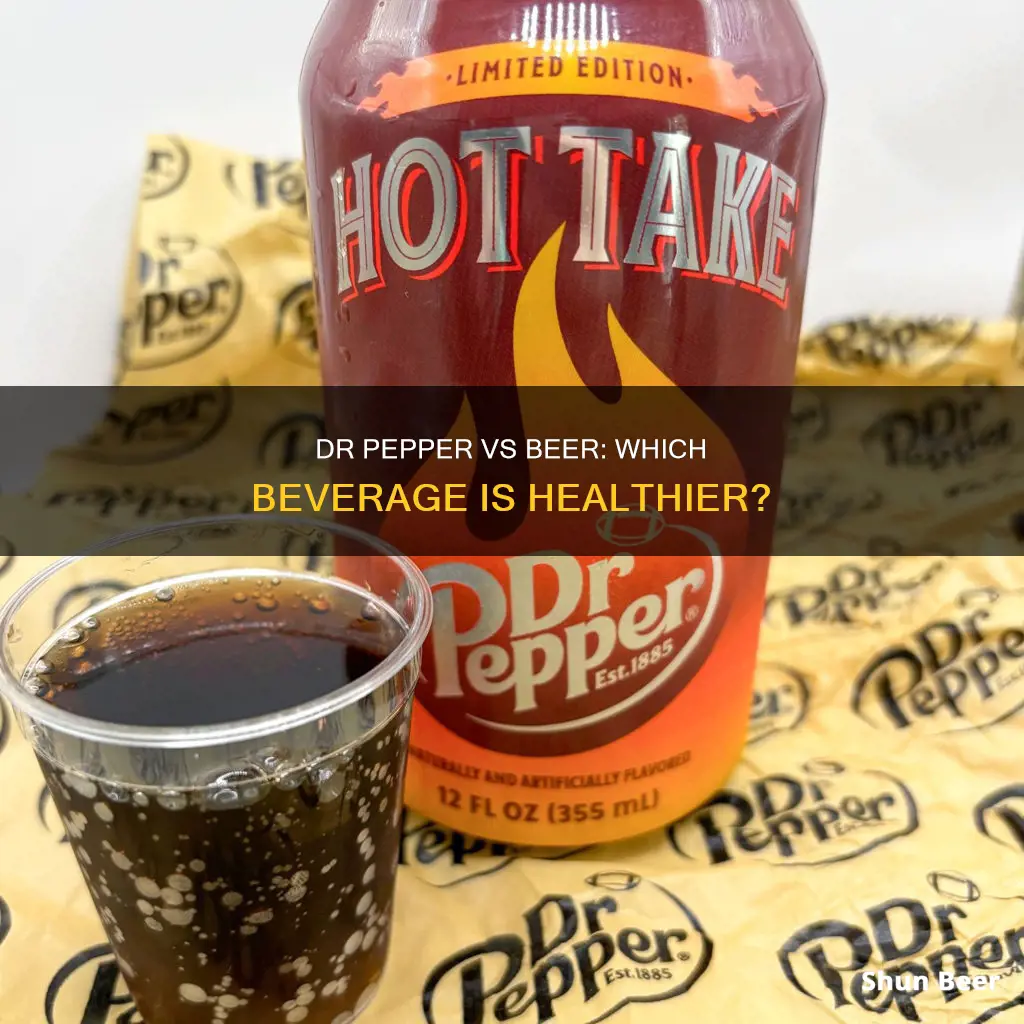
Soda and beer are both unhealthy drinks that should be consumed in moderation. Beer and soda both contain high levels of calories and sugar, which can lead to health issues such as weight gain, diabetes, and heart problems. However, beer contains less sugar than soda, with only 1 to 2 grams of residual sugar from the fermentation process, while a 12-ounce can of soda contains about 39 grams of sugar. Dr Pepper is a type of soda that has been compared to Coke and Pepsi in terms of healthiness, with sources stating that it has slightly less sugar than Coke, but more than Pepsi.
| Characteristics | Values |
|---|---|
| Sugar | Dr Pepper has 38 grams of sugar per 12 oz, while beer has 1-2 grams of sugar per 12 oz. |
| Calories | Dr Pepper has 140-170 calories, while beer has 100-250 calories depending on the type. |
| Ingredients | Dr Pepper contains high fructose corn syrup, carbonated water, caramel color, citric acid, phosphoric acid, and sodium benzoate. Beer is made from water, malt, hops, and yeast, with possible additions of adjuncts, fruits, spices, sugars, and flavored extracts. |
| Satisfaction and Satiety | Dr Pepper may suppress the feeling of fullness after a meal, leading to increased snack consumption. Beer is often described as filling due to its carbonation and calorie content, but alcohol can increase appetite. |
| Acidity | Dr Pepper is highly acidic with a pH of 2.5-4, which can impact dental, digestive, and bone health. Beer is mildly acidic with a pH of 4-4.5 and is generally not a health concern when consumed in moderation. |
| Alcoholic Content | Dr Pepper does not contain alcohol. Beer contains alcohol, which can impair judgment and coordination and have health effects with excessive consumption. |
What You'll Learn

Sugar content
Sugar is one of the most critical factors when comparing the health benefits of beer and soda. Excessive sugar consumption has been linked to adverse health effects, including higher blood pressure, inflammation, weight gain, diabetes, and fatty liver disease. Therefore, it is essential to understand the sugar content in both beer and soda to make an informed decision about their relative health benefits.
A 12-ounce can of standard soda typically contains about 39 grams of sugar, which is equivalent to approximately nine teaspoons of sugar. This amount far exceeds the recommended daily sugar intake for women (25 grams) and men (36 grams) suggested by the American Heart Association (AHA). As a result, consuming just one can of soda can quickly push an individual beyond their recommended daily sugar intake limit.
On the other hand, beer contains significantly less sugar. A standard 12-ounce serving of regular beer usually has around 1 to 2 grams of sugar. This sugar comes from the natural sugars found in the grains used during the brewing process. During fermentation, yeast consumes much of the sugar to produce alcohol, resulting in a relatively low final sugar content. Light beers may have slightly less sugar, while craft beers or specialty beers with added ingredients, such as fruit beers, might have slightly higher sugar content.
When comparing the sugar content of Dr Pepper soda and beer, it is evident that Dr Pepper has a much higher sugar content than beer. A 12-ounce can of Dr Pepper contains 38-39 grams of sugar, which is very close to the amount found in a regular can of soda. This amount of sugar far exceeds the recommended daily intake and can have negative health consequences if consumed regularly.
It is worth noting that the sugar content of Dr Pepper may vary slightly depending on the region. For example, the European version of Dr Pepper has been reported to have less sugar than the US version, and it also contains artificial sweeteners.
In conclusion, when it comes to sugar content, beer is the clear winner in the debate between beer and soda. Beer has a significantly lower sugar content than soda, and consuming it in moderation is less likely to contribute to excessive sugar intake. However, it is important to remember that both beer and soda should be consumed in moderation as part of a balanced and healthy diet.
Ultra Beer: Healthy Choice or Marketing Hype?
You may want to see also

Calories
When it comes to calories, neither beer nor soda can be considered healthy. Both drinks are high in calories and offer little to no nutritional value. However, it is important to note that the calorie content can vary depending on the specific brand and type of drink.
A 12-ounce can of regular soda typically contains between 140 and 170 calories or more. These drinks are often packed with added sugars, providing a high number of empty calories. For example, a can of Dr. Pepper contains 150 calories, while a can of Pepsi has 140 calories.
On the other hand, a 12-ounce serving of beer usually falls in the range of 100 to 150 calories. The calorie count depends on the type of beer and its alcohol content. Light beers, for instance, tend to have lower alcohol content and fewer calories, ranging from 90 to 100 calories per serving. Regular beers, with their moderate alcohol content, typically contain 140 to 180 calories. Craft beers can vary significantly, ranging from 150 to 250 calories or more. High-alcohol beers, such as certain IPAs or stouts, can reach even higher calorie counts, sometimes exceeding 350 calories per 12-ounce serving.
While beer generally has fewer calories than soda, it is important to remember that beer contains alcohol, which has its own health implications. Excessive alcohol consumption is linked to various health issues, including addiction, liver disease, and other negative consequences. Therefore, when considering calories, it is essential to also factor in the presence of alcohol in beer.
In summary, while beer may have a slight edge over soda in terms of calorie count, both drinks are high in empty calories and offer little nutritional value. The specific calorie content can vary within each category, depending on the brand and type of drink. However, it is crucial to remember that excessive consumption of either drink can have negative health effects, and moderation is key.
German Beer: Healthy Beverage or Not?
You may want to see also

Ingredients
Neither beer nor Dr Pepper can be considered a healthy beverage, and both should be consumed in moderation. However, beer is made from natural ingredients, while Dr Pepper contains artificial ingredients.
Beer Ingredients
Beer is made from four main ingredients: grains, hops, yeast, and water.
- Grains: Usually malted barley (barley grains that have been soaked in water). The starches from these are turned into sugars that interact with the yeast to make alcohol during the fermentation process. The type of grain used affects the colour, viscosity, and flavour of the beer.
- Hops: The flowers of the hop plant, Humulus lupulus. Hops are a bittering, flavouring, and stability agent. They balance out the sweetness of the malt and add complexity to the flavour and aroma of the beer. Hops also have antibacterial effects, giving beer a long shelf life.
- Yeast: A fungal microorganism that ferments carbohydrates (sugars) into alcohol. There are two main types of yeast used in beer: lager yeast, which ferments at colder temperatures, and ale yeast, which ferments at warmer temperatures.
- Water: Beer is around 90% water, which is why it's so refreshing. The mineral content of the water can affect the final taste of the beer.
Dr Pepper Ingredients
The exact ingredients of Dr Pepper are a closely guarded trade secret. The drink is said to be a blend of 23 natural and artificial flavours. Fans of the drink have guessed that it contains nine different fruit and vegetable extracts. Here are the ingredients that are believed to be part of Dr Pepper's proprietary formula:
- Sweeteners: Dr Pepper is sweetened with high-fructose corn syrup.
- Botanical Extracts: Botanicals are plant-based flavourings used for their aromatic, medicinal, or culinary properties. They are often used in distilled spirits, such as gin. Dr Pepper may use botanical extracts from any part of a plant, including leaves, seeds, roots, stems, and flowers.
- Other Ingredients: Dr Pepper likely contains other artificial ingredients to enhance its flavour, colour, and shelf life.
Beer Before Bed: Healthy Habit or Hindrance?
You may want to see also

Satisfaction and satiety
When it comes to satisfaction and satiety, beer and soda are on opposite ends of the spectrum. While soda is known to suppress the feeling of fullness after a meal, beer is often described as a very filling beverage. This is mainly due to the carbonation in beer, which can create a bloating sensation. The high amount of calories and carbohydrates in beer also contribute to the feeling of satiety.
However, it is important to note that the presence of alcohol in beer can affect your perception of fullness. Alcohol can increase appetite and reduce inhibitions, leading to overeating or consuming more food than your body needs. So, while beer may initially make you feel full, the effects of alcohol may lead to increased food consumption.
In summary, while beer may provide a temporary feeling of fullness or satiety, the effects of alcohol may ultimately lead to increased hunger and reduced resistance to unhealthy food choices. On the other hand, soda suppresses the feeling of fullness after a meal, leading to increased snacking and calorie intake. Therefore, neither beverage is ideal for promoting satisfaction and satiety.
Asahi Beer: Healthy Choice or Marketing Hype?
You may want to see also

Acidity
When it comes to acidity, both beer and soda are on the higher end of the spectrum. Acidity is measured on a pH scale, with 7 being neutral. Values below 7 indicate acidity, while values above 7 indicate alkalinity.
Most sodas have a pH level between 2.5 and 4, which is significantly more acidic than water, which has a pH of around 7. The high acidity in soda is due to the presence of citric, phosphoric, and other acids. This carbonation gives sodas their fizziness but can also have several negative health effects, including:
- Dental health issues: The acid in soda can erode tooth enamel over time, leading to dental cavities and tooth sensitivity. Enamel is a protective coating on teeth that prevents them from decaying and gives them their unique colour. Once it's gone, it's gone for good.
- Digestive health issues: Some people may experience acid reflux or heartburn after consuming acidic beverages like soda.
- Bone health issues: Excessive consumption of acidic beverages, especially those containing phosphoric acid, may negatively impact bone health over time.
Dr Pepper, in particular, has a pH level of 2.89, which is very close to that of Coke and Pepsi. This makes it more acidic than other sodas like 7UP and Mountain Dew, which have pH levels of 3.20 and 3.22, respectively.
Beer is also generally acidic due to the presence of carbonic acid, which forms when carbon dioxide (CO2) dissolves in water, giving beer its characteristic fizziness. Additionally, other acids may be produced during the brewing process. The pH of beer can vary depending on the style and brewing process, but it typically ranges from 4 to 4.5, making it slightly less acidic than soda. The mild acidity in beer is not typically a significant health concern when consumed in moderation.
In terms of acidity, beer is the less acidic beverage of the two. However, it's important to note that both beer and soda are highly acidic and can have negative health effects, especially when consumed in large quantities.
Ale vs Beer: Which is the Healthier Choice?
You may want to see also
Frequently asked questions
No, Dr Pepper is not considered a healthy drink due to its high sugar content and the presence of artificial sweeteners and chemical additives.
Dr Pepper contains about 39 grams of sugar per 12-ounce can, which exceeds the recommended daily limit by the American Heart Association.
Beer typically contains significantly less sugar than Dr Pepper. A standard 12-ounce serving of beer usually has around 1 to 2 grams of sugar.
Beer may offer some potential health benefits due to its lower sugar content and the presence of trace minerals such as potassium, magnesium, phosphorus, and selenium. However, these benefits should be weighed against the risks associated with alcohol consumption.
Yes, Diet Dr Pepper and Dr Pepper Zero Sugar are available as lower-calorie and sugar-free alternatives to regular Dr Pepper. However, these versions may still contain artificial sweeteners and other additives that could have potential health risks.







